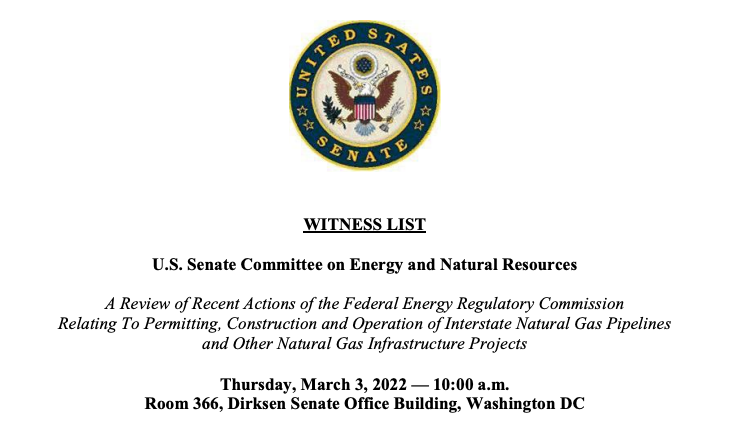FERC Certificate Policy Changes Attract Congressional Scrutiny
What’s the issue?
Last week FERC rolled out long awaited changes to its Certificate Policy that determines the “public convenience and necessity” of interstate natural gas pipelines. It also issued a new “interim” policy that addresses greenhouse gas (GHG) emissions with respect to pipeline projects and now requires staff to prepare a full Environmental Impact Statement (EIS) for every project that proposes to increase the capacity of a pipeline by more than 5,200 dth/day.
The massive impacts of the policy revision are not going unnoticed by the Senate Energy and Natural Resources Committee, which provides oversight of FERC — hearing for which has been scheduled on Thursday, March 3, 2022, at 10:00 a.m., “to review recent actions of the Federal Energy Regulatory Commission relating to permitting construction and operation of interstate natural gas pipelines and other natural gas infrastructure projects.”
Why does it matter?
The economic realities and compliance challenges inherent to these policy changes will significantly slow and possibly stop any future FERC-regulated gas pipeline infrastructure from ever being built.
What’s our view?
There are a number of ways congressional oversight committees can exert pressure on executive agencies when dissatisfied with their actions. The most powerfully persuasive is by controlling their funding, but appropriations originate in the House and not the Senate. The Senate can forcefully remind agency officials, in this case, FERC Commissioners, what it judges to be within and not within the purview of its authorizing statutes. Questions along those lines will likely be the main substance of this hearing.
In addition to the extraordinary confluence of events happening in the world now and impacting global and domestic energy markets is an important Senate hearing that will scrutinize a recent FERC policy change that effectively stops new and expansion construction of pipeline infrastructure.
The stated purpose of the hearing to be held on Thursday, March 3, 2022, at 10:00 a.m. is “to review recent actions of the Federal Energy Regulatory Commission relating to permitting construction and operation of interstate natural gas pipelines and other natural gas infrastructure projects.”

ICYMI, last week FERC rolled out long awaited changes to its Certificate Policy that determines the “public convenience and necessity” of interstate natural gas pipelines. It also issued a new “interim” policy that addresses greenhouse gas (GHG) emissions with respect to pipeline projects and now requires staff to prepare a full Environmental Impact Statement (EIS) for every project that proposes to increase the capacity of a pipeline by more than 5,200 dth/day. The policy also suggests that developers, to gain project approval, will need to mitigate all operational and downstream greenhouse gas emissions. The economic realities and compliance challenges inherent to these changes will significantly slow and possibly stop any future FERC-regulated gas pipeline infrastructure from ever being built.
The massive impacts of the policy revision are not going unnoticed by the Senate Energy and Natural Resources Committee, which provides oversight of FERC. Both the Democratic Committee Chairman, Sen. Joe Manchin, and the Ranking Member, Sen. John Barrasso, issued statements critical of FERC’s new policy. (By coincidence, the U.S. Supreme Court heard oral arguments this week on a case, West Virginia v. EPA, that will likely determine if FERC’s statutory authority is sufficient to allow this policy change.)
There are a number of ways congressional oversight committees can exert pressure on executive agencies when dissatisfied with their actions. The most powerfully persuasive is by controlling their funding, but appropriations originate in the House and not the Senate. The Senate can forcefully remind agency officials, in this case, FERC Commissioners, what it judges to be within and not within the purview of its authorizing statutes. Questions along those lines will likely be the main substance of this hearing.
In so doing, the Members can build a Congressional record to inform future legislative action or to backstop political dealmaking. It’s no secret that Sen. Manchin — “the other Joe” — has exerted significant influence on the agenda of President Joe, who appointed Chairman Glick. That level of influence could certainly be used to request executive branch personnel decisions in exchange for legislative support.
Over time, Congress could write new legislation or change the makeup of the Commission by confirming only future appointees who hold compatible views on critical aspects of the law.
At Thursday’s hearing, the line of questions with respect to the new certificate policy will probably focus on:
- Has Congress authorized FERC to regulate the production, gathering and sale of natural gas?
- Has Congress authorized FERC to regulate where and how natural gas is used in this country?
- Is FERC's duty under the Natural Gas Act to “encourage the orderly development of plentiful supplies of . . . natural gas at reasonable prices?”
It will be most illuminating to all stakeholders if senators ask FERC Commissioners how these new policies fit within the regulatory framework inherent in the above questions and where in the law they find support for the changes they have made.